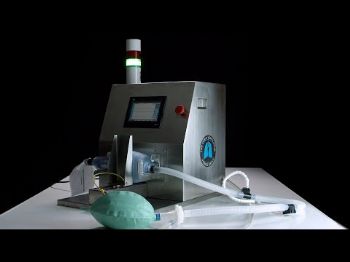
Omron, an internationanl industrial automation, healthcare and electronic components specialist, has taken part in the development of a newly designed ventilator in Spain, in a project spearheaded by TheOpenVentilator a not-for-profit association to help health workers combat Covid-19.
Various projects were presented to the Spanish Ministry of Health — TheOpenVentilator project was developed from Celera, a youth science programme in Spain. It has become the ventilator to be approved by the Spanish Electrical Engineering Official Central Laboratory (LCOE), which is regulated by the Spanish Agency of Medicines and Medical Products. It is similar to devices already available and can be approved for CE marking once the pandemic has been defeated and the development has been carried out in under two weeks with the help of funding from the Mapfre Foundation; the support of the Community of Madrid; the Rey Juan Carlos University; and a broad business consortium.
The ventilator is now being tested in a clinical trial looking at its compassionate use with patients at Hospital de Alcorcón in Madrid and Vall d´Hebron in Barcelona. It has already proven itself to be robust and reliable in an intensive care setting.
The new device is similar to commercial ventilators that are already available, but is more advanced than those currently used as an emergency solution in field hospitals. It incorporates a machine learning feature that gives it the capability to adjust its performance to medical needs in real time.
Omron focused on the design, developmental support, programming and the supply of the necessary electronic components for the ventilator. It has been designed for rapid manufacture, with laser-cut mechanical parts in stainless steel, and industrial-grade electronic components that are both standardised and readily available.
The company’s Sysmac Controller has been a key element of Omron's approach — it allows healthcare professionals to implement the most widely used ventilation methods in mainstream ventilators, by combining advanced process regulation and machine learning.
This allows the movements of the servo drive for the ventilation mechanism to be adapted to meet each patient's needs. It also includes a 7in screen that shows the air pressure and flow in real time. All of these components are integrated into the Sysmac Automation Platform, which guarantees coordination between the different parts.
Mass production of the ventilator will now be possible at a significantly lower cost than existing ventilators on the market. This is due to the collaboration of a consortium of companies that have shared their facilities, staff and components in Madrid and Barcelona. Omron has contributed to this by sharing its expertise with electronic equipment for the healthcare industry, along with Fabrez, igus and Finsa.
Mapfre Foundation’s role has been essential in funding the development and manufacture of the prototype. The first 50 devices will be donated by the Foundation to various hospitals in Spain. The aim is to provide Spanish communities with a robust and functional device that can help health workers to save lives. Rey Juan Carlos University has participated as a promoter of the project. The process has required solving a complex legal framework, from both business and medical points of view.
Javier Asensio, medical coordinator of TheOpenVentilator, and a doctor at Hospital 12 de Octubre, said: “Our goal has been to create a solution, equivalent to the commercial ventilators that are already approved, that can be trusted by medical specialists.”
Javier González, materials engineer and head of the project, said: “It is not just a simple portable ventilator used by a field hospital to get through the crisis. What we have achieved is a robust and functional device, at a very low cost and with scalable production capacity.”
In relation to other similar projects currently being developed, product coordinator Álvaro Gallego said: “We do not see them as competitors, but rather as fundamental and intertwined projects in the fight against coronavirus, for which we must join forces. We are convinced that TheOpenVentilator has one of the most complete and safe technical and medical capabilities. In fact, this has been the first equipment to be approved by the Spanish health authorities.”
Raúl Nicolás, Robotics Solutions Engineer at Omron Iberia, said: “We are very proud of the R&D engineers who have voluntarily taken part in the project. This is a crucial moment to demonstrate the harmony between companies, institutions and people. Our four colleagues have been working hard since the 23 March, day and night, in order to create the best possible ventilator to help those that need it the most in this unprecedented health crisis.”
He added: “We have done our best to provide the ventilator with the most suitable electronic components, following medical advice and making the production easier thanks to the best industrial technology available in the market.”
TheOpenVentilator has been successfully tested in line with all current regulations, including electrical safety and EMC controls, combined with the clinical trials at the hospitals in Spain. These will allow the mass production of the ventilator to start, so that it is ready to help patients and alleviate the lack of ventilators around the world.